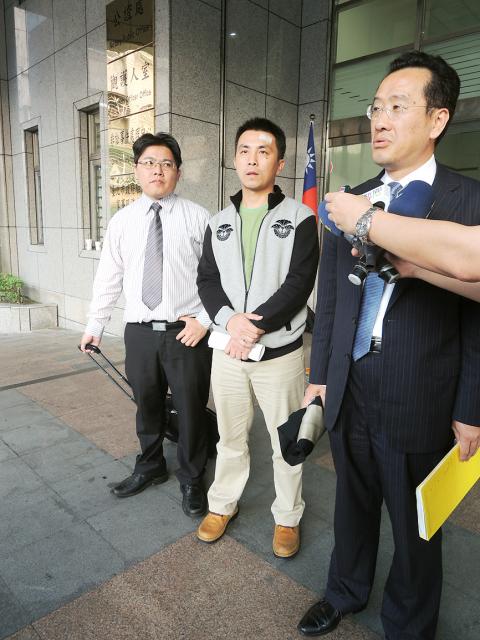The Taipei District Court on Friday ruled that the Taipei City Government must pay NT$300,000 in compensation to a man who was beaten by police during a crackdown on the Sunflower movement protests at the Executive Yuan in March and April last year.
Lin Ming-hui (林明慧), a teacher from Taichung, filed the suit alleging excessive use of force in violation of the Act Governing the Use of Police Weapons (警械使用條例).
Lin sought compensation from the Executive Yuan, Taipei City Government, National Police Agency and Taipei City Police Department.

Photo: Chang Wen-chuan, Taipei Times
Lin said he took part in a sit-in protest at the Executive Yuan on March 24 last year.
“The protesters sat on the ground peacefully, and nobody had a weapon. But the riot police used violent tactics and wielded batons, striking people,” he said.
A picture of Lin walking away to receive medical treatment, his face and clothing covered in blood, was among the most prominent photographs featured in media coverage of the protesters’ occupation of the Executive Yuan.
Following Friday’s ruling, Taipei Mayor Ko Wen-je (柯文哲) said that his government would not appeal the decision.
Lin said he wants to salute the judge for the decision, as winning the case has symbolic meaning.
“However, the government is still applying the same old authoritarian thinking to the current protest by high-school students against textbook curriculum guideline changes,” he said.
Lawyer Wellington Koo (顧立雄) said the ruling was to rectify the government’s unlawful actions and could be used for reference in future litigation.
“It was regrettable that the court did not hold former premier Jiang Yi-huah (江宜樺) responsible, as he ordered the police to remove the protesters,” Koo said.
The ruling cited the use of excessive police force against protesters, as Lin was holding on to another person next to him when police tried to disperse the crowd by pulling them away one by one.
“Police may use physical force to remove and carry people away, but when using batons, the officers should only have struck at Lin’s hands, and not at his head,” the ruling said.
It added that in Lin’s case, the officers had violated Articles 9 and 10 of the Act Governing the Use of Police Weapons, which state: “The police should avoid using lethal force unless the situation is so imminent that the lives of officers or bystanders are being threatened,” and “after using the police weapons, the police officer must report his/her use to his/her immediate supervisors except for using a baton as a way to give directions.”
Throughout the hearing and investigation, the police force did not take steps to identify the officer who hit Lin. Instead, it gave the captain of the riot police squad two demerits as punishment.
Lin’s lawyer, Lu Chiu-yuan (呂秋遠), said that was not good enough.
“It has been over a year since the incident, but police are still unable to find out the identity of the officer,” he said. “I hope Mayor Ko can help to find the officer responsible, because we must not let taxpayers foot the bill for police violence.”

SECURITY: As China is ‘reshaping’ Hong Kong’s population, Taiwan must raise the eligibility threshold for applications from Hong Kongers, Chiu Chui-cheng said When Hong Kong and Macau citizens apply for residency in Taiwan, it would be under a new category that includes a “national security observation period,” Mainland Affairs Council (MAC) Minister Chiu Chui-cheng (邱垂正) said yesterday. President William Lai (賴清德) on March 13 announced 17 strategies to counter China’s aggression toward Taiwan, including incorporating national security considerations into the review process for residency applications from Hong Kong and Macau citizens. The situation in Hong Kong is constantly changing, Chiu said to media yesterday on the sidelines of the Taipei Technology Run hosted by the Taipei Neihu Technology Park Development Association. With

A US Marine Corps regiment equipped with Naval Strike Missiles (NSM) is set to participate in the upcoming Balikatan 25 exercise in the Luzon Strait, marking the system’s first-ever deployment in the Philippines. US and Philippine officials have separately confirmed that the Navy Marine Expeditionary Ship Interdiction System (NMESIS) — the mobile launch platform for the Naval Strike Missile — would take part in the joint exercise. The missiles are being deployed to “a strategic first island chain chokepoint” in the waters between Taiwan proper and the Philippines, US-based Naval News reported. “The Luzon Strait and Bashi Channel represent a critical access

CARROT AND STICK: While unrelenting in its military threats, China attracted nearly 40,000 Taiwanese to over 400 business events last year Nearly 40,000 Taiwanese last year joined industry events in China, such as conferences and trade fairs, supported by the Chinese government, a study showed yesterday, as Beijing ramps up a charm offensive toward Taipei alongside military pressure. China has long taken a carrot-and-stick approach to Taiwan, threatening it with the prospect of military action while reaching out to those it believes are amenable to Beijing’s point of view. Taiwanese security officials are wary of what they see as Beijing’s influence campaigns to sway public opinion after Taipei and Beijing gradually resumed travel links halted by the COVID-19 pandemic, but the scale of

Pope Francis is be laid to rest on Saturday after lying in state for three days in St Peter’s Basilica, where the faithful are expected to flock to pay their respects to history’s first Latin American pontiff. The cardinals met yesterday in the Vatican’s synod hall to chart the next steps before a conclave begins to choose Francis’ successor, as condolences poured in from around the world. According to current norms, the conclave must begin between May 5 and 10. The cardinals set the funeral for Saturday at 10am in St Peter’s Square, to be celebrated by the dean of the College